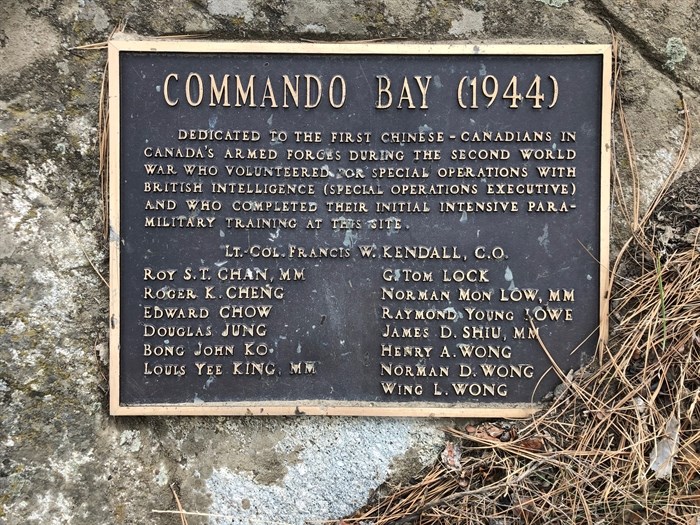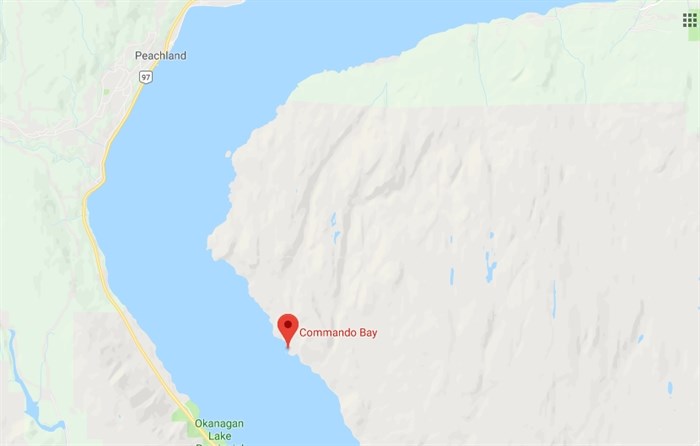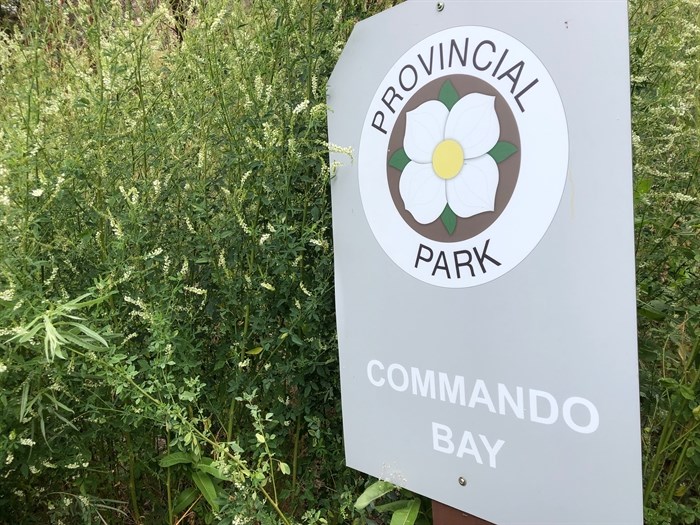
The placard dedicated to the 13 Chinese-Canadians who trained in Commando Bay in 1944.
(MARSHALL JONES / iNFOnews.ca)
September 23, 2020 - 10:50 AM
KELOWNA - It takes a lot of work to get to Commando Bay. You can hike for hours through rough terrain, bumpy hills, and dense forests. Perhaps you can find a plane to fly you over the spot and parachute your way down like a Second World War paratrooper.
The most common way to get there, like most things around sprawling Okanagan Lake, is by kayak. Armed with a good paddle and a decent sense of direction, you can set out from Okanagan Lake Provincial Park and find the bay on the other side of the water. After a few hours of dodging boats and giving your arms a solid workout, you land at Commando Bay.
At a glance, it doesn't seem like much; just another part of the coast. Of course, that's intentional. All remnants of Commando Bay's history were stripped and removed more than 70 years ago. All that remains to mark the site's importance is a humble plaque dedicated to the men who broke racial barriers to serve their country.
If you look at Commando Bay in the right light you can almost see them, still training for a dangerous mission that's sadly fallen through the cracks of history.

Bird's eye view of Commando Bay.
Image Credit: Google Maps
Local historian Sharron Simpson knows how difficult it is to nail down the story behind Commando Bay. Simpson's book, The Kelowna Story, is an exhaustive record of the Okanagan's past. During her research, she found information on Commando Bay to be particularly scarce.
"It takes some real scouting to find much information," she said. "It was so secretive."
Commando Bay's history deserves to be acknowledged, as it played a key role in Canada's Second World War involvement. It was on that shred of land in 1944 that 13 Chinese-Canadians trained for Operation Oblivion.
It was an ominous title for a dangerous operation. In 1944 Canada's involvement in the European section of the Second World War was winding down, but the Pacific theatre was still active. They needed to tackle the Japanese army in a variety of ways, including sabotage. The government realized the Canadian military's primarily white soldiers would stand out in the South West Pacific area, a big problem for less-direct strategies. The military decided to turn to Chinese-Canadians for help.

Commando Bay is a secret worth exploring.
(MARSHALL JONES / iNFOnews.ca)
Chinese-Canadians wouldn't be allowed to vote in Canada until 1947, but 25 people still volunteered for Operation Oblivion, which would involve soldiers enlisting local resistance fighters behind enemy lines in the Pacific. 13 Chinese-Canadians were chosen.
Commando Bay was chosen as a training site due to its rugged and diverse terrain. A wharf was built at the site. Over four months the recruits were trained in small arms, demolition, sabotage, communications, and other guerilla tactics. The training was top secret, as the trainees rarely left Commando Bay or interacted with the locals, except for one incident Simpson found where the trainees helped a man pick fruit.
"People in the area would not have known about it," she said.
After their crash course in Commando Bay, trainees were sent to Australia for parachute training before they were dropped into Borneo. They were instrumental in driving the Japanese forces from the area.
"They were very heroic and under-represented," she said.
As for Commando Bay, it was torn down. The wharf was removed and any sign of military involvement was taken away. All that remains is the plaque which explains how the area got its namesake along with a few campsites.
So the next time you're paddling down Okanagan Lake, keep a keen eye on the shoreline; you might stumble across a piece of military history nearly lost to time.
— This story was originally published on July 29, 2020
To contact a reporter for this story, email Sean Mott or call (250) 864-7494 or email the editor. You can also submit photos, videos or news tips to the newsroom and be entered to win a monthly prize draw.
We welcome your comments and opinions on our stories but play nice. We won't censor or delete comments unless they contain off-topic statements or links, unnecessary vulgarity, false facts, spam or obviously fake profiles. If you have any concerns about what you see in comments, email the editor in the link above.
News from © iNFOnews, 2020